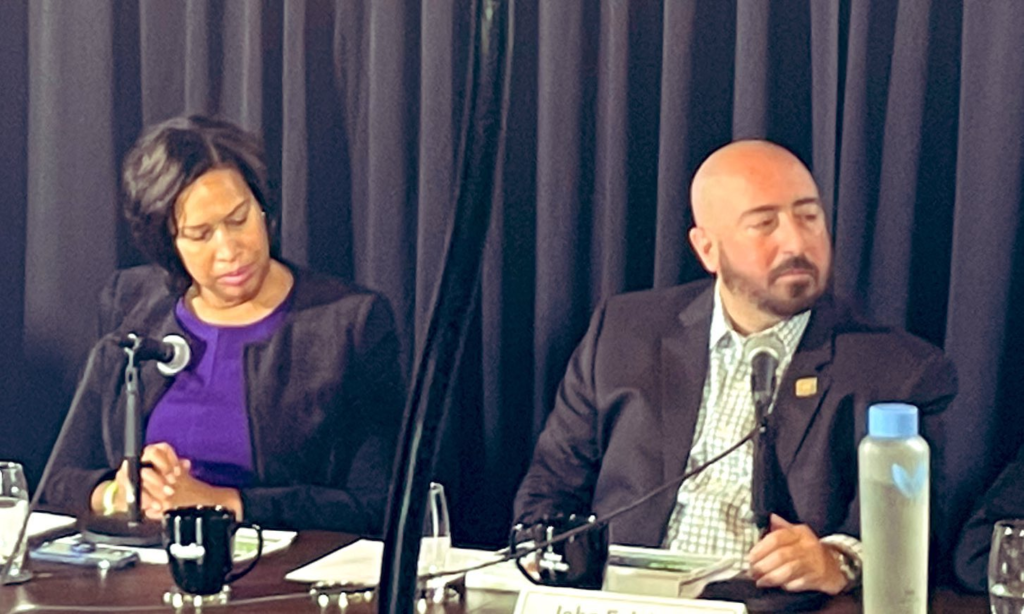Since the very beginning of Muriel Bowser’s eight years as the mayor of Washington, D.C., she and the city council have failed to consistently see eye to eye on policy measures and administrative decisions concerning accountability, crime, and the way crime should be policed. This disunity stems from fundamental differences between Bowser’s and the council’s views and allegiances. While Bowser’s political philosophy typically favors police and harsh criminal penalties, the council has been known to lean further to the left on such issues and demonstrates this by regularly calling police behavior into question. During her mayorship, Bowser has consistently called for greater protections and benefits for members of the Metropolitan Police Department (MPD), and the council has consistently questioned her on the viability of acting on those calls.
Conflicts of Interest
Their most recent clash concerns the questions of investigative transparency, accountability, and conflicts of interest. In March of this year, Mayor Bowser’s office presented the details of her 2024 proposal for the city’s budget to the council, a proposal that included a controversial provision that would see the MPD obtain governance over D.C.’s crime lab, the Department of Forensic Sciences (DFS). The DFS infamously lost its accreditation in 2021 after a national forensics board’s report found that the lab “deliberately concealed information†and “engaged in misrepresentations and fraudulent behavior,†behavior that includes a 2015 murder case in which evidence examiners were allegedly pressured to stand by previous findings that they then knew to be erroneous.
Bowser’s budget proposal seeks to move the part of the DFS that analyzes and processes the evidence found at crime scenes, the Crime Scene Science Division, into the MPD’s hands, a move completely antithetical to the DFS’s founding intention of acting independently of law enforcement officials. The move also contradicts a bill passed by the council earlier this year that restructures the DFS as an independent agency and requires greater transparency from it, such as an included provision mandating that the lab report all allegations of errors, negligence, and other professional misconduct.
The mayor’s view is that overhauling the agency in accordance with her proposal will set the DFS on the path of being accredited again, a thought process that city council chair Phil Mendelson (D) called “a completely tangential argument that doesn’t hold up.†It would appear that his fellow councilmembers agree with him, as they voted unanimously last Tuesday to reject the mayor’s proposal. The council and outside observers alike criticized the move, slamming it as liable to increase the potential for more conflicts of interest and injustice within the department.
The council doubled down on their calls for departmental transparency last Thursday when Ward 2 Councilmember Brooke Pinto (D), along with At-Large Councilmember Christina Henderson (D) and Ward 5 Councilmember Zachary Parker (D), introduced a bill that would require the Office of Unified Communications, the city’s agency for emergency calls and dispatching, to report information pertaining to wait times, response times, and mistakes made after calls to 911.
Issues with Investigations
Concern over conflicts of interest and accountability arose again when the majority of the council publicly opposed the singularity of an internal investigation into two women’s allegations of sexual harassment by former deputy mayor John Falcicchio, propounding the need for an independent investigation in addition to the internal one. The mayor’s office released a four-page summary of the investigation late last Saturday night that confirmed Falcicchio’s misconduct. Falcicchio, who resigned in March before the allegations became public, had previously been Bowser’s chief of staff and was a close confidant of hers. Although the investigation concluded that Falcicchio was guilty of wrongdoing, proponents for an independent investigation believe that there could be more to uncover than the mayor’s office is

letting on.
Questions surrounding the integrity of the investigation abound for several reasons beyond Falcicchio and Bowser’s professional relationship. Councilmembers Parker, Henderson, and Matthew Frumin (D-Ward 3) all cited the curious timing of the report’s publishing, as it was not only published late on a weekend night but late on a three-day weekend night, leading the DCist to describe the releasing of the report as being done “quietly†and “surreptitiously.â€
The announcement of Falcicchio’s resignation back in March similarly raised eyebrows as it was tucked in the middle of a weekend press release. It was also reported in March that, although she ordered the internal investigation almost as soon she was first briefed, Bowser was aware of the allegations eight days ahead of Falcicchio’s resignation and kept him on the payroll nonetheless. In contrast to the council’s calls for an independent investigation, both the mayor and Vanessa Natale, the deputy director of the Mayor’s Office of Legal Counsel, have said that no further investigations should be necessary.
A History of Disagreement
Ideological discord over criminal justice between Mayor Bowser and the D.C. Council dates all the way back to 2015, Bowser’s first year as mayor. In response to a forty-percent spike in the District’s homicides, Bowser proposed a highly controversial bill that would’ve allowed law enforcement officials to conduct warrantless searches of the homes of certain ex-offenders on parole, probation, and supervised release. After being panned by the council’s judiciary committee, many of the city’s residents, the attorney general, the D.C. police union, and more, the bill was dead—massacred, more accurately—on arrival.
A major talking point during Bowser’s reelection campaign last year was whether the hiring of more MPD officers was an appropriate response to the city’s growing homicide rates. Bowser’s budget proposal that year involved a plan to bolster the police force to four thousand officers up from its current thirty-five hundred. After the council’s judiciary committee approved the budget with the caveat of removing some of the pro-police benefits, among them some perks related to housing assistance and tuition benefits, Bowser criticized the changes, stating that she won’t be able to hire the officers the city needs “if you take away the tools that need to do it.†Judiciary committee chair Charles Allen (D-Ward 6) slammed Bowser’s ire as politically motivated and wholly unfounded and argued that between the city’s twenty thousand dollar signing bonus for new officers and what remained of the budget’s benefits for police, new officers still had more than enough incentive to fulfill her hiring plan.
Police Issues
At-Large Councilmember Robert White (D) and Ward 8 Councilmember Trayon White (D), who at the time were running against Bowser in the Democratic mayoral primary, both challenged her insistence on the goal of four thousand officers, with Robert White criticizing it as

an arbitrary number with no basis in research. Trayon White, noting that the District’s most violent years occurred contemporaneously with an increased police presence, expressed that he was similarly skeptical about the necessity and potential benefits of so many more officers.
Bowser and the council were also mired in a regular back-and-forth on the subject of police presence in schools. After the council voted unanimously in 2021 to begin gradually removing police officers from schools, the mayor asked the council to repeal the measure as part of her budget proposal the following year (the same budget that sought four thousand officers), and the council replied by voting eight to five to uphold the previous year’s decision. But just last month, the changes of heart reflected in 2022’s closer vote took hold of the majority, and the council finally decided to grant Bowser’s wish by quietly repealing the initiative.
Clashing on Code
Another recent point of contention between the mayor and council concerned the latter’s unanimous approval last November of a bill overhauling the city’s criminal code. The changes proposed in the bill seriously challenged the ideological foundations of Bowser’s administration as it pertains to the criminal justice system, effectively softening the city’s treatment of suspected and convicted offenders in an attempt to expand defendants’ rights and modify penalties so that they’re commensurate with the associated crimes. The bill reduced certain mandatory maximum penalties, eliminated most mandatory minimum sentences, and expanded defendants’ rights to jury trials. The mayor predictably vetoed the bill in January. At its core, the new code flies in the face of her yearslong commitment to her broad, harsh, characteristically tough-on-crime approach to the penalization of D.C.’s offenders.
In a twelve-to-one vote, the city council overrode the mayor’s veto. The bill was then sent to Congress for consideration, where it was blocked on bipartisan lines with the support of President Biden. Emboldened by the council’s attempts to soften the city’s stance on crime, Bowser proposed new legislation last month that would harshen penalties for illegal gun possession, give courts greater freedom to decide who should be held ahead of a trial, and make strangulation a felony assault, among other provisions. The council has yet to vote on the bill, but if the past is any indication, a fight is likely.


